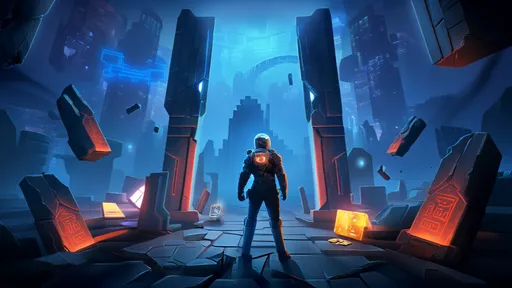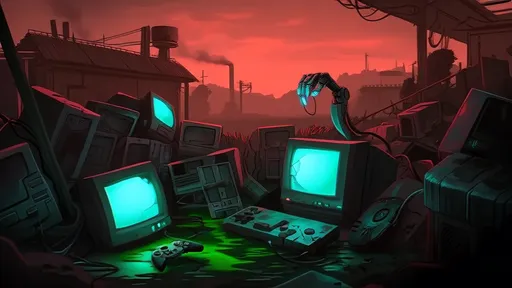The concept of entropy, borrowed from thermodynamics and applied to virtual worlds, presents a fascinating framework for understanding the hidden costs of maintaining digital universes. As online ecosystems grow in complexity, developers face an escalating battle against chaos—what game theorists now call the "entropic decay" of virtual environments. This phenomenon manifests in everything from server infrastructure strain to the behavioral economics of player communities.
At its core, the entropy principle suggests that all systems naturally progress toward disorder unless energy is expended to maintain their structure. In massively multiplayer games, this translates to an arms race against bugs, exploits, and the gradual unraveling of carefully designed mechanics. World of Warcraft's infamous "Corrupted Blood" incident—where a raid mechanic accidentally became a pandemic—demonstrates how emergent player behavior can accelerate entropy. The development team ultimately spent more engineering hours containing this virtual plague than some small nations devote to public health crises.
The infrastructure demands reveal another layer of entropic pressure. Modern game servers must process petabytes of player-generated data daily—from housing market fluctuations in EVE Online to terrain modifications in Minecraft. Each interaction represents potential entropy: a transaction that could glitch, a physics calculation that might fail, or a memory leak waiting to cascade. Cloud architecture has merely shifted rather than solved this challenge, with auto-scaling systems consuming enough electricity annually to power mid-sized cities.
Player communities themselves become entropy amplifiers through metagaming—the practice of optimizing fun out of systems. When gamers collectively solve content too efficiently (like speedrunning or min-maxing), developers must invest in artificial friction: daily caps, time-gated content, or increasingly convoluted progression systems. These countermeasures paradoxically require more maintenance while often reducing player satisfaction—a lose-lose scenario that highlights the diminishing returns of entropy control.
Economic ecosystems within games present perhaps the purest expression of entropic decay. Virtual currencies inevitably inflate, rare items become commonplace through duplication exploits, and player-driven markets trend toward oligarchy without constant intervention. The team behind Final Fantasy XIV reportedly employs full-time "economist" roles whose sole responsibility involves monitoring and adjusting thousands of interrelated variables to prevent total market collapse—a task comparable to central banking during economic crises.
Emergent technologies promise both solutions and new complexities. Blockchain integration theoretically allows for self-policing systems through smart contracts, yet introduces novel attack vectors like 51% attacks. Machine learning can predict entropy hotspots before they destabilize, but requires such vast training datasets that some studios now treat their entire player base as unwitting QA testers. The ethical implications alone could power doctoral dissertations.
The arms race extends to content creation pipelines. Procedural generation tools that once promised infinite worlds now demand infinite debugging, as seen in No Man's Sky's rocky launch. Even handcrafted environments aren't immune—Bethesda's Creation Engine famously accumulates "save bloat" over time, where cumulative player actions gradually corrupt game files until entire playthroughs become unstable. The solution? Periodic "hard resets" that essentially sacrifice continuity for stability.
Perhaps most alarmingly, entropy manifests in player psychology itself. The dopamine-driven feedback loops underlying engagement metrics inevitably decay, requiring ever more extravagant rewards to maintain retention. This psychological inflation pushes developers toward manipulative design—a trend the industry now euphemistically calls "live service optimization." The human cost becomes measurable in burnout rates among both players and developers caught in this unsustainable cycle.
As virtual worlds approach the complexity thresholds of real societies, their maintenance begins mirroring real-world governance challenges. The team managing Second Life's virtual economy operates tools comparable to IMF monitoring systems, while GTA Online's anti-cheat division employs techniques borrowed from cybersecurity firms. These aren't game developers anymore—they're digital civil servants managing microcosms with GDPs rivaling developing nations.
The ultimate irony? Our attempts to impose order often accelerate entropy. Every new rule creates loopholes, each patch introduces fresh exploits, and all content expansions dilute the original vision. Like Sisyphus pushing his boulder, game teams now understand their work isn't about achieving perfect stability, but rather managing the rate of decay. In this light, the most successful virtual worlds may be those that learn to harness entropy creatively—turning chaos into features rather than fighting it as bugs.

By /Jul 3, 2025

By /Jul 3, 2025

By /Jul 3, 2025

By /Jul 3, 2025

By /Jul 3, 2025

By /Jul 3, 2025

By /Jul 3, 2025

By /Jul 3, 2025

By /Jul 3, 2025

By /Jul 3, 2025

By /Jul 3, 2025

By /Jul 3, 2025

By /Jul 3, 2025

By /Jul 3, 2025

By /Jul 3, 2025

By /Jul 3, 2025

By /Jul 3, 2025

By /Jul 3, 2025